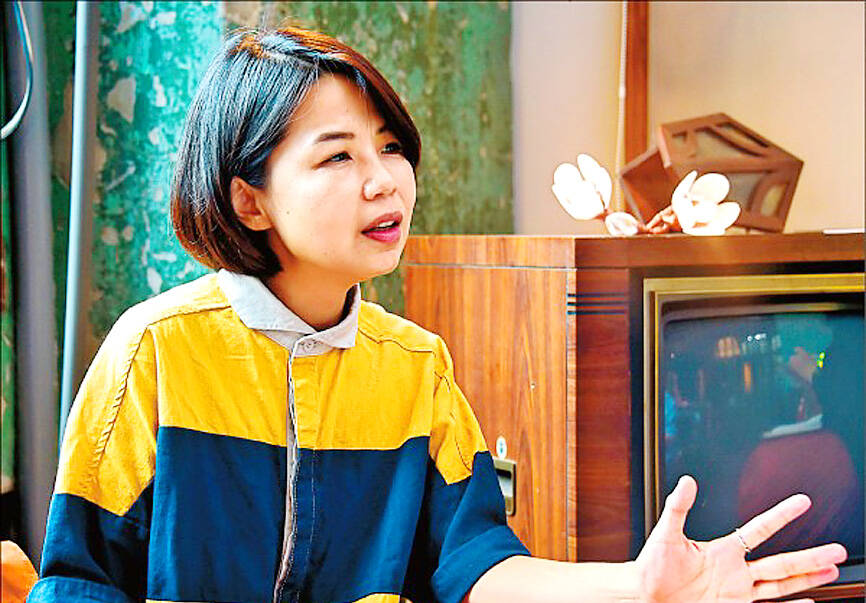Taiwanese director Chen Wei-ling (陳慧翎), a multiple Golden Bell Award winner, died on Wednesday at the age of 48, a close friend of hers said.
Sarso Chou (周銓), a producer who had known Chen for nearly 15 years, told CNA on Wednesday that the director had passed away peacefully at Taipei Municipal Wanfang Hospital earlier in the day, with her mother and close friends at her side.
Chen was the director of several popular television series in Taiwan, including Year of the Rain (那年,雨不停國), Autumn’s Concerto (下一站,幸福) and Material Queen (拜金女王).

Photo: Pan Shao-tang, Taipei Times
Between 2008 and 2019, she won several Golden Bell awards for Best Director, Best Screenplay and Best Editing.
One of her recent series, Mom, Don’t Do That! (媽,別鬧了!) was streamed on Netflix last year. It tells the story of a 60-year-old mother who decides to find love again after her husband’s death, to the joy and annoyance of her two daughters.
In 2013, Chen was diagnosed with cervical cancer and had been hospitalized multiple times since, but she continued her work as a filmmaker.
Chou, Chen’s long-standing friend, said they had worked together on multiple projects over the years.
Prior to Chen’s death, they had been planning two new projects, one of which would tell the story of Chen’s mother, Chou said, adding that he would strive to help complete those films.
“Some people say we had a ‘twin flame’ relationship that went beyond soulmates,” he said, expressing grief at the loss of his dear friend.
Many loved ones were at Chen’s side when she passed away, Chou said.

Taiwan has received more than US$70 million in royalties as of the end of last year from developing the F-16V jet as countries worldwide purchase or upgrade to this popular model, government and military officials said on Saturday. Taiwan funded the development of the F-16V jet and ended up the sole investor as other countries withdrew from the program. Now the F-16V is increasingly popular and countries must pay Taiwan a percentage in royalties when they purchase new F-16V aircraft or upgrade older F-16 models. The next five years are expected to be the peak for these royalties, with Taiwan potentially earning

STAY IN YOUR LANE: As the US and Israel attack Iran, the ministry has warned China not to overstep by including Taiwanese citizens in its evacuation orders The Ministry of Foreign Affairs (MOFA) yesterday rebuked a statement by China’s embassy in Israel that it would evacuate Taiwanese holders of Chinese travel documents from Israel amid the latter’s escalating conflict with Iran. Tensions have risen across the Middle East in the wake of US and Israeli airstrikes on Iran beginning Saturday. China subsequently issued an evacuation notice for its citizens. In a news release, the Chinese embassy in Israel said holders of “Taiwan compatriot permits (台胞證)” issued to Taiwanese nationals by Chinese authorities for travel to China — could register for evacuation to Egypt. In Taipei, the ministry yesterday said Taiwan

‘LIKE-MINDED PARTNER’: Tako van Popta said it would be inappropriate to delay signing the deal with Taiwan because of China, adding he would promote the issue Canadian senators have stressed Taiwan’s importance for international trade and expressed enthusiasm for ensuring the Taiwan-Canada trade cooperation framework agreement is implemented this year. Representative to Canada Harry Tseng (曾厚仁) in an interview with the Central News Agency (CNA) said he was increasingly uneasy about Ottawa’s delays in signing the agreement, especially as Ottawa has warmed toward Beijing. There are “no negotiations left. Not only [is it] initialed, we have three versions of the text ready: English, French and Mandarin,” Tseng said. “That tells you how close we are to the final signature.” Tseng said that he hoped Canadian Prime Minister Mark Carney

POSITIVE DEVELOPMENT: Japan and the US are expected to hold in-depth discussions on Taiwan-related issues during the meeting next month, Japanese sources said The holding of a Japan-US leaders’ meeting ahead of US President Donald Trump’s visit to China is positive news for Taiwan, former Japan-Taiwan Exchange Association representative Hiroyasu Izumi said yesterday. After the Liberal Democratic Party’s landslide victory in Japan’s House of Representatives election, Japanese Prime Minister Sanae Takaichi is scheduled to visit the US next month, where she is to meet with Trump ahead of the US president’s planned visit to China from March 31 to April 2 for a meeting with Chinese President Xi Jinping (習近平). Japan and the US are expected to hold in-depth discussions on Taiwan-related issues during the